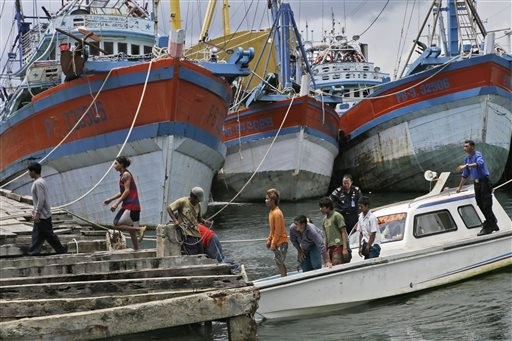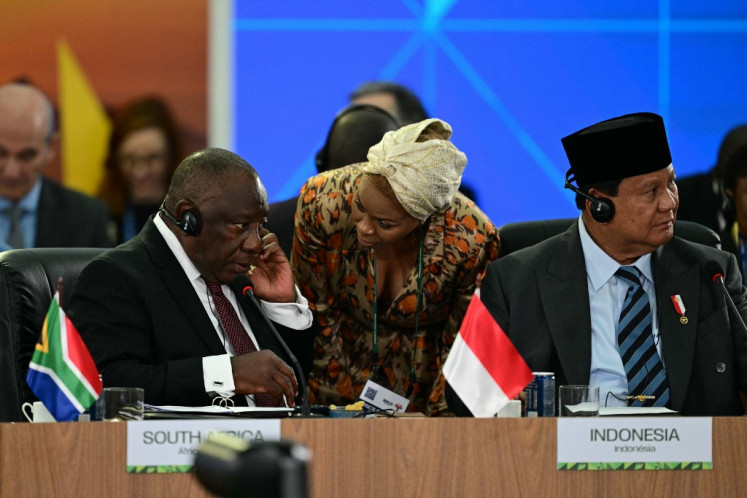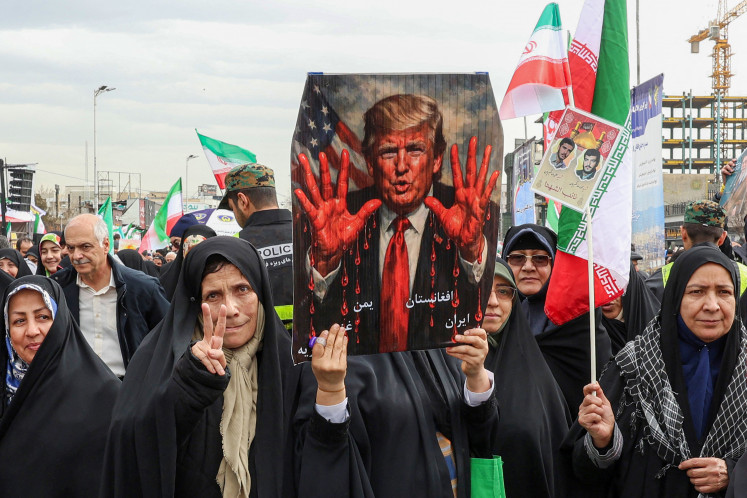Popular Reads
Top Results
Can't find what you're looking for?
View all search resultsPopular Reads
Top Results
Can't find what you're looking for?
View all search resultsPutting fishing crimes out of business
A study conducted by the UN Office on Drugs and Crime revealed that fishing vessels were often used for smuggling migrants, illicit traffic in drugs, illicit traffic in weapons and terrorism.
Change text size
Gift Premium Articles
to Anyone
 Burmese fishermen arrive at the compound of Pusaka Benjina Resources to report themselves for departure to leave the fishing company in Benjina, Aru Islands, Indonesia as hundreds of foreign fishermen rush at the chance to be rescued from the isolated island where an Associated Press report revealed slavery runs rampant in the industry, April 3, 2015. (AP/Dita Alangkara)
Burmese fishermen arrive at the compound of Pusaka Benjina Resources to report themselves for departure to leave the fishing company in Benjina, Aru Islands, Indonesia as hundreds of foreign fishermen rush at the chance to be rescued from the isolated island where an Associated Press report revealed slavery runs rampant in the industry, April 3, 2015. (AP/Dita Alangkara)
E
very time we eat seafood at a waterfront restaurant there is a one-in-five chance that the fish was trawled outside of the law, according to a study by The Pew Charitable Trusts.
Global losses from illegal, unreported and unregulated (IUU) fishing are estimated to be 26 million metric tons of fish annually. Our government claims that national losses from IUU fishing have contributed to annual economic losses of up to a whacking US$20 billion.
Indonesia itself has taken a stringent stance on IUU fishing nationally by imposing a “scuttling-vessel” policy for foreign vessels caught poaching in its waters. Indonesia is also fervently mobilizing its diplomatic machinery to try to convince the international community to frame IUU fishing as a transnational organized crime, such as at the 25th session of the Commission on Crime Prevention and Criminal Justice. Previously, our diplomats wooed Norway, the US, Australia, Mexico, South Africa and Namibia for support.
Yet questions remain in the legal arena because many feel that our efforts are relatively sporadic and could miss the bull’s-eye in doing so. First, how would international law define a crime as a transnational crime?
The international legal regime does not contain a precise definition of “transnational organized crime” per se. Nevertheless, there are elements of “organized criminal group” activity. If we can portray the elements of organized criminal group activity to correspond with the characteristics of IUU fishing then we can infer that IUU fishing constitutes an organized crime.
Article 2(a) of the UN Convention against Transnational Organized Crime (UNTOC) covers these elements. The most determinant elements primarily are the doers’ profit-driven nature and the seriousness of the offenses they commit. Meanwhile, “transnational” elements cover transgressions committed, planned, controlled or operated in more than one state. Thus, the quintessence of transnational organized crime extends to all profit-motivated, serious criminal activities with interstate implications.
On the other hand, IUU fishing is the term used to describe any unauthorized fishing and fishing activities conducted in breach of regional, national or international rules and regulations. It includes fishing without a permit, fishing without reporting to the relevant authorities or even fishing without nationality.
A study conducted by the UN Office on Drugs and Crime revealed that fishing vessels were often used for smuggling migrants, illicit traffic in drugs, illicit traffic in weapons and terrorism. IUU fishing is often not merely a detached crime, but designed by webs of organized groups beyond national borders and linked to other forms of serious organized crime.
For instance, fishing operators consist of sophisticated transnational corporate syndicates and use financial havens to conceal the proprietors’ identity. Illegal fishing operations are a massively convoluted nexus involving fleets of fishing vessels that share the same supply, crewing and refueling services. These networks enable transshipments of illegally caught fish at sea. Illegally caught fish are typically added to legally caught fish and laundered on the market by means of misreporting catch documentation or via circumventing or bribing port fishery officials.
From the perspective of legal reasoning, the elements of transnational organized crime also prevail in IUU fishing activities due to the profit as well as the seriousness of the offenses that the syndicates commit while transcending national boundaries.
Second, is it feasible to incorporate IUU fishing in the transnational organized crime scheme?
Organized crime itself is not static, but habituates as new categories of crime materialize. The UNTOC, also known as the Palermo Convention, does not classify crimes. This lack of definition and lax categorization of transnational crimes was deliberate to give space for newly emerged transnational crimes, including IUU fishing. As such, it means that there is still a possibility of recognizing IUU fishing as a transnational organized crime.
Third, which mechanism possesses authority to constitute IUU fishing as a transnational organized crime?
The Palermo Convention established a conference known as the Conference of the Parties to review the implementation of this convention. In 2010, state parties convened the fifth Conference of Parties and identified cybercrime, identity-related crimes, trafficking in cultural property, environmental crime, piracy, organ trafficking and fraudulent medicine as new and emerging crimes of concern. Following a series of sessions, three protocols on trafficking in persons, the smuggling of migrants and the trafficking of firearms were adopted to augment the convention.
The Conference of Parties is a legitimate avenue to broach and discuss the purview of transnational crimes. It has borne three protocols and it is the conference that was specifically appointed by the international community to formulate updated efforts in dealing with transnational crimes. The eighth session of the conference will be held on Oct, 17 to 21 in Vienna. This is the venue that our diplomatic machinery should concentrate upon. Indonesia can propose one protocol under the Palermo Convention that specifically focuses on IUU fishing, in such a fashion that the crime can be internationally conceptualized as an integral part of transnational crime and a legally binding instrument forged.
Conceptualizing IUU fishing as a transnational organized crime within the convention architecture is indispensable as it will help unravel the missing link in the chain of other serious crimes. For Indonesia, it will tap cooperative transnational legal measures with other states, especially with flag states, port states and flag of convenience states.
Cooperation that overarches — from confiscation, extradition, transfer of sentenced person and mutual legal assistance to joint investigation, special investigative technique and transfer of proceedings — will spawn artificially extensible jurisdiction to the aggrieved state. For these legal measures will make sure that there is no place on Earth that poachers, trawlers, human traffickers, embezzlers and drug dealers can hide in the fishing industry and live with impunity. At the end of the day, Indonesia will also earn recognition as a global maritime fulcrum for its indefatigability in taking a strong global stance on IUU fishing.
If crime crosses borders, so does the law and its enforcement. By transnationalizing this fishing crime, it means my crime (Indonesia) is now becoming your crime (another state) and my responsibility now is also your responsibility. Let’s put IUU fishing out of business together.
***
The writer is LL.M candidate in public international law at University College London.
---------------
We are looking for information, opinions, and in-depth analysis from experts or scholars in a variety of fields. We choose articles based on facts or opinions about general news, as well as quality analysis and commentary about Indonesia or international events. Send your piece to community@jakpost.com.









